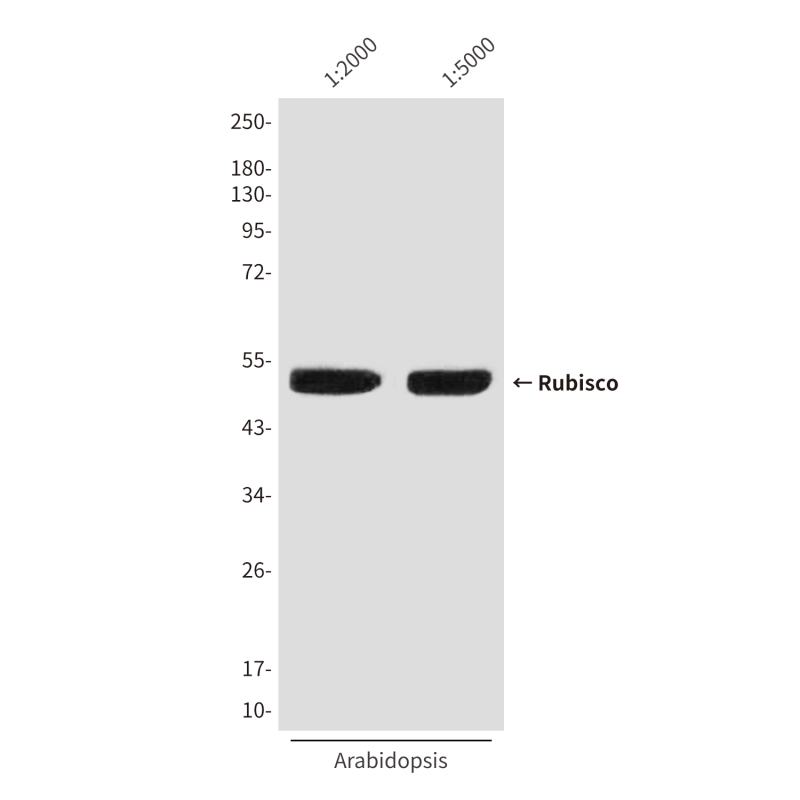
| WB | 咨询技术 | Plant |
| IF | 咨询技术 | Plant |
| IHC | 咨询技术 | Plant |
| ICC | 技术咨询 | Plant |
| FCM | 咨询技术 | Plant |
| Elisa | 咨询技术 | Plant |
| Aliases | Ribulose bisphosphate carboxylase oxygenase |
| Entrez GeneID | - |
| clone | 1E3 |
| WB Predicted band size | Calculated MW: 53 kDa; Observed MW: 53 kDa |
| Host/Isotype | Mouse IgG1 |
| Antibody Type | Primary antibody |
| Storage | Store at 4°C short term. Aliquot and store at -20°C long term. Avoid freeze/thaw cycles. |
| Species Reactivity | Plant |
| Immunogen | Purified recombinant protein expressed in E.coli. |
| Formulation | Purified antibody in PBS with 0.05% sodium azide,0.5%BSA and 50% glycerol. |
+ +
以下是3条关于Rubisco抗体的参考文献示例(内容基于领域内典型研究方向,可能存在文献标题或作者的简化概括):
1. **"Production and characterization of a polyclonal antibody against spinach ribulose-1.5-bisphosphate carboxylase/oxygenase"**
- **作者**: Mae T. 等
- **摘要**: 研究报道了从菠菜中纯化的Rubisco大亚基(RbcL)免疫兔制备多克隆抗体的方法,验证了抗体在Western blot和免疫沉淀中的高特异性,适用于检测多种植物中Rubisco的含量。
2. **"Monoclonal antibodies against rice Rubisco: Tools for studying assembly of Rubisco subunits"**
- **作者**: Ishikawa N. 等
- **摘要**: 利用水稻Rubisco大亚基和小亚基制备单克隆抗体,通过免疫化学分析揭示了亚基在叶绿体中的组装过程及环境胁迫对组装效率的影响。
3. **"Cross-reactivity of anti-tobacco Rubisco antibodies with enzymes from C3 and C4 plants"**
- **作者**: Parry M.A.J. 等
- **摘要**: 评估了烟草来源的Rubisco抗体在多种C3和C4植物中的交叉反应性,发现其能广泛识别不同物种的RbcL,但小亚基(RbcS)特异性存在种属差异。
---
注:以上文献为示例性概括,实际引用需根据具体论文内容调整。建议通过学术数据库(如PubMed、Web of Science)以“Rubisco antibody”或“Ribulose-1.5-bisphosphate carboxylase antibody”为关键词检索最新文献。
Rubisco (Ribulose-1.5-bisphosphate carboxylase/oxygenase) antibodies are essential tools in plant biology research, targeting the most abundant enzyme on Earth. Rubisco catalyzes the fixation of atmospheric CO₂ into organic molecules during photosynthesis, playing a central role in the Calvin-Benson cycle. Due to its critical function and high abundance in plant tissues (particularly in chloroplasts), Rubisco is often used as a marker protein in studies of plant physiology, stress responses, and photosynthetic efficiency.
Antibodies against Rubisco are widely employed to detect and quantify the enzyme in various applications, including Western blotting, immunolocalization, and transgenic plant analysis. They help researchers assess Rubisco expression levels under different environmental conditions (e.g., light, temperature, or nutrient stress) or in genetically modified plants. These antibodies typically target conserved regions of the large subunit (RbcL, encoded by chloroplast DNA) or the small subunit (RbcS, encoded by nuclear DNA), enabling species-specific or cross-reactive detection.
Commercial Rubisco antibodies are often raised in rabbits or mice using purified plant Rubisco as an antigen. However, challenges include potential cross-reactivity with Rubisco isoforms from non-target species or unintended protein interactions. Validated antibodies with high specificity are crucial, as Rubisco’s abundance can dominate protein extracts, complicating analyses of low-abundance proteins. Beyond basic research, Rubisco antibodies also support agricultural and ecological studies aimed at optimizing crop productivity or understanding plant adaptations to climate change.
×